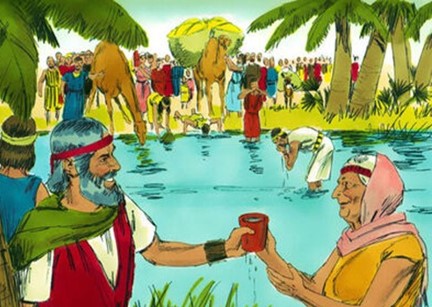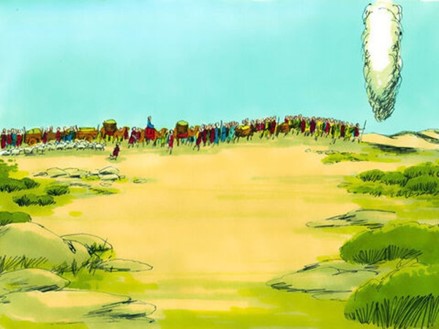Good morning!
Greetings in the name of the Father, the son, and the Holy Spirit.
I prayed to the LORD my God and confessed: “O Lord, you are a great and awesome God! You always fulfill your covenant and keep your promises of unfailing love to those who love you and obey your commands. (Daniel 9:4)

The Israelites arrived at the Marah, which means bitter. After a three-day journey through the desert without finding water, they arrived at an oasis. They all believed it was the answer to their prayer, but the water produced by the oasis was too bitter to drink. What a blow to their faith in God and Moses, who led them!
Only three days ago, the Israelites put their faith in God and in his servant Moses. They walked through the middle of the Red Sea on dry ground, and the water stood up like gigantic walls on both sides. However, God utterly destroyed the Egyptian army by burying them deep into the Red Sea by returning the water to the original place after the Israelites safely passed through to the other side. When they arrived on the other side, they looked back and saw God’s mighty work. Then the bodies of the Egyptians were washed up on the seashore. The people of Israel saw the power that God unleashed against the Egyptians, and the Israelites were filled with awe before him.
Yes, it was only three days ago that they put full trust in God and Moses, and now they cried out and complained to God while asking why. Sure, their behavior is understandable. They walked through the desert without finding water for three days. All kept praying for water with contrite hearts. Then they found the oasis, but it only produced water that they could not drink.
It was the moment all hopes were gone. All felt that they were deceived as looking at the oasis producing bitter water. If they had not seen the useless water, it could have been better. They did not have a false hope, at least. The bitter water truly tested their faith in God. All failed and complained. Then they became truly angry at God.
Moses was also deeply disturbed by the bitter water. Who did pray most for the water while walking through the desert for the last three days? Of course, Moses. His faith was also tested by the bitter water, and he struggled. On top of his own struggle, his fellow Israelites, more than two million strong, put all blame on him. Moses truly struggled to endure the bitter water and the angry and complaining Israelites.
Only three days ago, the same people praised him while putting complete trust in him, As Moses remembered the faces who praised him, which made him even more difficult to endure. But as he saw his fellow angry Israelites picking up stones, he ran for his life and hid.
Although he barely missed stoning to death, Moses was completely distressed. In his hiding place, he waited for himself to come back. It was a truly difficult experience. Moses tried to rationalize what had happened, but he could not. None of them did make sense.
How long did Moses spend in the hiding place? Nobody knew exactly because even Moses could not tell. Then slowly all things were coming back to him, starting from God’s calling of Moses through the burning bush, splitting the Red Sea, walking on the dry ground through the Red Sea between the gigantic walls of waters on both sides, watching returning the water of the Red Sea making thundering noise, which buried all Egyptian army with it, and the joyful noise of the Israelites at the scene, who looked truly believing and trusting in God.

What particularly bothered Moses was that the Israelites’ excitement and praise for God’s miracle were short-lived. All became a mob and tried to kill Moses. Thus Moses had to run and hide himself to save his life. Moses was trying his best to overcome his disappointment over the bitter water. It was even harder to carry the burden of the angry Israelites. It was truly a challenging time for Moses. Although he prayed, the result was uncontrollable. Yes, he had to pray to God, but it was not easy. Moses struggled.
Of course, God saw Moses struggle, who was His beloved servant. God especially dearly loved Moses and stretched out His merciful hand and touched Moses’ heart. Suddenly, Moses felt that his spiritual strength had returned and had the strength to stand up against all his own struggle and the enormous pressure from his fellow Israelites. Then Moses started to pray to God. His prayer was not a plea for his own life, but it was a thanksgiving. Yes, it was a thanksgiving to God, and it was a transcending moment. Moses could not tell how he could give thanksgiving to God with such spiritual strength, but only God could tell.
Rejoice always, pray continually, and give thanks all circumstances, which is the will of God in Christ Jesus. (Thessalonian 5:16-18)
Then Moses continued praying to God. As praying to God, he slowly but steadily felt he was becoming one with God. All struggles against the dark cloud of doubt of God and His holiness and the disappointment and fear of the two million Israelites subsided. Then all turned into one prayer of his victorious praise of thanksgiving.
How was this possible? Moses finally saw and understood the reason why God provided the bitter water despite three days of intensive and contrite prayers to God. Most of all, he understood what God was about to do because God revealed His plan to Moses.
Do not be anxious about anything, but in every situation, by prayer and petition, with thanksgiving, present your requests to God. And the peace of God, which transcends all understanding, will guard your hearts and your minds in Christ Jesus. (Philippians 4:6-7)
God did not bring up the bitter water to punish or even kill the Israelites by extreme dehydration who faithfully prayed to God for water. Instead, it was a gift from God in God’s love to the Israelites who had experienced the extraordinary Red Sea miracle three days ago while walking on the dry ground through the sea. God also let them have the completely devastating experience of the bitter water after a three-day journey through the desert without water while praying to God for water, which directly attacked their faith in God.
After all, having faith in God because of seeing a miracle is not true faith. True faith shines when darkness comes. So far, the Israelites’ faith in God was just a mere small remnant of God’s glorious miracle that split the Red Sea.
No one can be a true believer because the person experienced a miracle. A miracle fades as time goes by from memory or even quickly evaporates as the situation changes. How long did the Israelites’ praise lead to angry complaints to God? Only three days. Again, it is understandable why they were so angry at and complained to God. They were extremely dehydrated to the level of dying in the middle of the desert. Only if the water was not bitter could they have survived and would not have complained?
Jesus replied, “I tell you the truth, you want to be with me because I fed you, not because you understood the miraculous signs.” (John 6:26)

Then if God’s plan was not to let the Israelites really die in the middle of the desert, what was God’s real plan for them? Let’s ask, didn’t God split the Red Sea? Yes, God did and gave an unforgettable memory of the miracle for them. Then why didn’t they believe God would save them again despite what they found was the useless bitter water? Wasn’t the bitter water yet another way to bring a miraculous blessing to the Israelites?
Of course, the answer is yes. Then why did the Israelites angrily complain to God and try to stone Moses? Surely at that moment, they thought that it was the most logical and rational course of action that they had to take. Anything other than what they had done was illogical in their eyes.
Who can determine what is logical or illogical? God or the Israelites?
This is not just the question for the Israelites who struggled about 3,500 years ago but for us living today. We see many heartbreaking things around us and experience pain in our lives, and we feel that we never deserve such pain. Yes, to our eyes, all do not make sense at all because none of them are illogical, and we cannot explain why.
However, from God’s point of view, it is truly logically planned and perfectly executed. Then the question is how to understand God’s perfect plan by seeing from God’s point of view. It is only possible by transcending all our understanding. Only God can see past, present, and future. Not just a future but the exact future that will happen precisely. Remember that God plans and governs all times: past, present, and future together. How about us? We cannot. We cannot know even one-second future. Is anyone who can claim that the person knows even one-second future?
Yes, we cannot see the future. If so, then there will be neither mistake nor accident. All things would turn out perfectly as planned perfectly for the future. But we cannot do this due to the critically missing capability of seeing the future, which only belongs to God.
Our God is good. Indeed, infinitely good. Then what kind of future will God bring? Perfect future without any mistakes and accidents. It is only possible with God’s omnipotent power and His infinite goodness, which is always magnified all times and under all circumstances.
Also God dearly loves us because we are His children, the most precious to Him. Then what will our future be like? It will be perfect according to God’s will in His infinite goodness embedded in His unfathomable love.
Then why is the present time that we experience not even close to what we expect, and we feel it is far from perfect? Shouldn’t all things that we experience reflect God’s infinite goodness? Then why do we feel sorrow, pain, disappointment, heartbreak, sadness, and misery, often no word to describe?
Of course, we all search for an answer, but the answer cannot be easily found as long as we search for it as we do for all other earthly matters. The Israelites did exactly the same: tasting the bitter water and making a conclusion using their own rationale and then getting angry and complaining to God. This phenomenon is not unusual because we all act like the Israelites if the condition is right, as the Israelites did. We get angry and complain to God.
Then why did God bring the bitter water to the Israelites? The answer is rather profound: God wants a truly deep and loving relationship with His children under all circumstances. God clearly knows the very obstacle between Him and us from building a truly deep, loving relationship with God is our sinful nature.
Let’s examine our sinful nature here. If we get good things, then we give thanks to God. But soon, we get used to getting good things that God brings to us. Then we ask more to satisfy our appetite. Why? Our sensory system and brain are designed to feel and appreciate the difference rather than the absolute value.
Thus, to feel the same when we get a good thing, we need more of the good things. If we get the same thing always, then we quickly become numb to the same good thing we get. Unless there is a difference, we soon feel nothing. But our brain remembers the excitement when we got the god thing initially, which was huge because it was the first time. Then our brain searches for the same excitement by craving to get it again, which, in reality, cannot be duplicated. But our brain asks regardless again and again, which drives our behavior – asking more and more to satisfy our earthly satisfaction.
Thus, we cannot be satisfied unless we get more each day. Can everyone can more and more each day in this world? No. The world is finite, and there is no way to provide more and more forever. Thus, it will not and cannot happen, but our sensory system and brain keep demanding. Even a king cannot be an exception. Is there any king who ever lived felt that he had enough? None.
Then what has to be done not to be insanely demanding good things perpetually? Rather than supplying more and more, our expectation needs to be reset from time to time by starting all over again. Then we will regain room to grow, but it might reach the level again later that we cannot get anymore. Then again, it needs to be reset again. If not, we soon complain again while craving more on earth. Then God has to reset, although it is painful, our expectations to receive what God provides with thanksgiving, which leads to a healthy relationship with God.
But we cannot say precisely when God will reset our expectations, but when God does, it introduces sorrow, pain, disappointment, heartbreak, sadness, and even misery into our lives. Again, we cannot predict when and how these will come, but one thing clear is that God knows exactly what, when, and how such things should be introduced into our lives to have a healthier relationship with God.
Surely, it is true that through our pain, which is the very act of God who resets our expectations, we get close to God, and God, who loves us madly, leads us through the paths of righteousness. It happened to the Israelites. They became angry and complained about the bitter water to God, but it was the resetting moment. Then God turned it into sweet water that they could enjoy. Their enjoyment of the water was much greater than they could have if they had found sweet water as soon as they arrived at the oasis.

However, we should not focus on their enjoyment only. The key point is that God wants them to learn how to live with God for the rest of their lives. So far, they praised God because they saw the miracle. Then they became angry and complained to God because they got bitter water. It is not faith that God wants. As God is always faithful, God wants the Israelites to be always faithful to God under all circumstances. That is, what God wants is an absolutely trusting relationship with God.
If anyone claims that he or she has faith in God and behaves as if the person does not know God and His character of absolute faithfulness under all circumstances, can we say the person has true faith in Him? All believers who truly believe in God should always be faithful to God under all circumstances while trusting His infinite goodness. How does God foster our faith to grow deeper in Him? God provides an opportunity here and there to experience Him truly.
The Israelites angrily complained to God, but God provided even so. What did they learn then? God’s faithfulness. Surely they again experienced God’s faithfulness. They experienced first when they feared getting killed by the Egyptian army on the other side of the Red Sea. Then they complained about the bitter water. In both cases, they failed to give thanks to God. God knew their faith was still maturing. Thus, God provided the unforgettable Red Sea miracle and turned the bitter water into sweet water.
Their relationship with God started with the Red Sea experience, but it was a flowery side of their faith, which came with a very shallow root. Such a shallow root cannot endure any test but immediately expose its shallowness, such as when they found the bitter water. In other words, their trust in God was not yet deeply rooted. It was more or less an emotional response to the Red Sea miracle.
Indeed, what happened with the bitter water was God’s major concern about the Israelites from the beginning. Here is what Bible says:
When Pharaoh finally let the people go, God did not lead them along the main road that runs through Philistine territory, even though that was the shortest route to the Promised Land. God said, “If the people are faced with a battle, they might change their minds and return to Egypt.” So God led them in a roundabout way through the wilderness toward the Red Sea. Thus the Israelites left Egypt like an army ready for battle. (Exodus 14:17-18)

During the tenth plague, Pharaoh lost his firstborn son. Then Pharaoh let the Israelites go. The destination of the Israelites was the Promised Land. However, God did not let the Israelites go into the Promised Land, which was about a week away on foot. In other words, the Israelites could have entered the Promised Land a week later. However, God made them detour. Why? They did not have a truly deeply rooted faith in God. In short, they did not have enough faith in God to occupy the Promised Land in a Godly way.
God provided both the Red Sea miracle and the bitter water disaster only because God dearly loved them. God knew exactly how shallow their faith in Him was. Then God used the pain of the bitter water to experience Him deeply. Only after they tasted the water turned sweet they realized who God was, and their faith was one step closer to God, which was not just emotionally driven by the unforgettable Red Sea miracle but through the pain of tasting the bitter water.
God dearly loves us because we are His beloved children. We saw how God was faithful to the Israelites, who experienced two extremes. Most of us would not experience such two extremes, but we should expect something in between, but we remember that it is the very manifestation of His Love toward us. If we can truly believe this truth, we are already one step closer to Him. Then we will, step by step, get even close to God. Someday, we will be able to give thanks to God, even if we taste bitter water like the Israelites.
Dear brothers and sisters in God, let’s ask ourselves. What should be our response to all circumstances? Thanksgiving. Yes, our thanksgiving to God under all circumstances. Why? God is always faithful to us in His infinite goodness and love under all circumstances. It is the promise of God and our faith.

Whatever is good and perfect is a gift coming down to us from God our Father, who created all the lights in the heavens. He never changes or casts a shifting shadow. (James 1:17)
